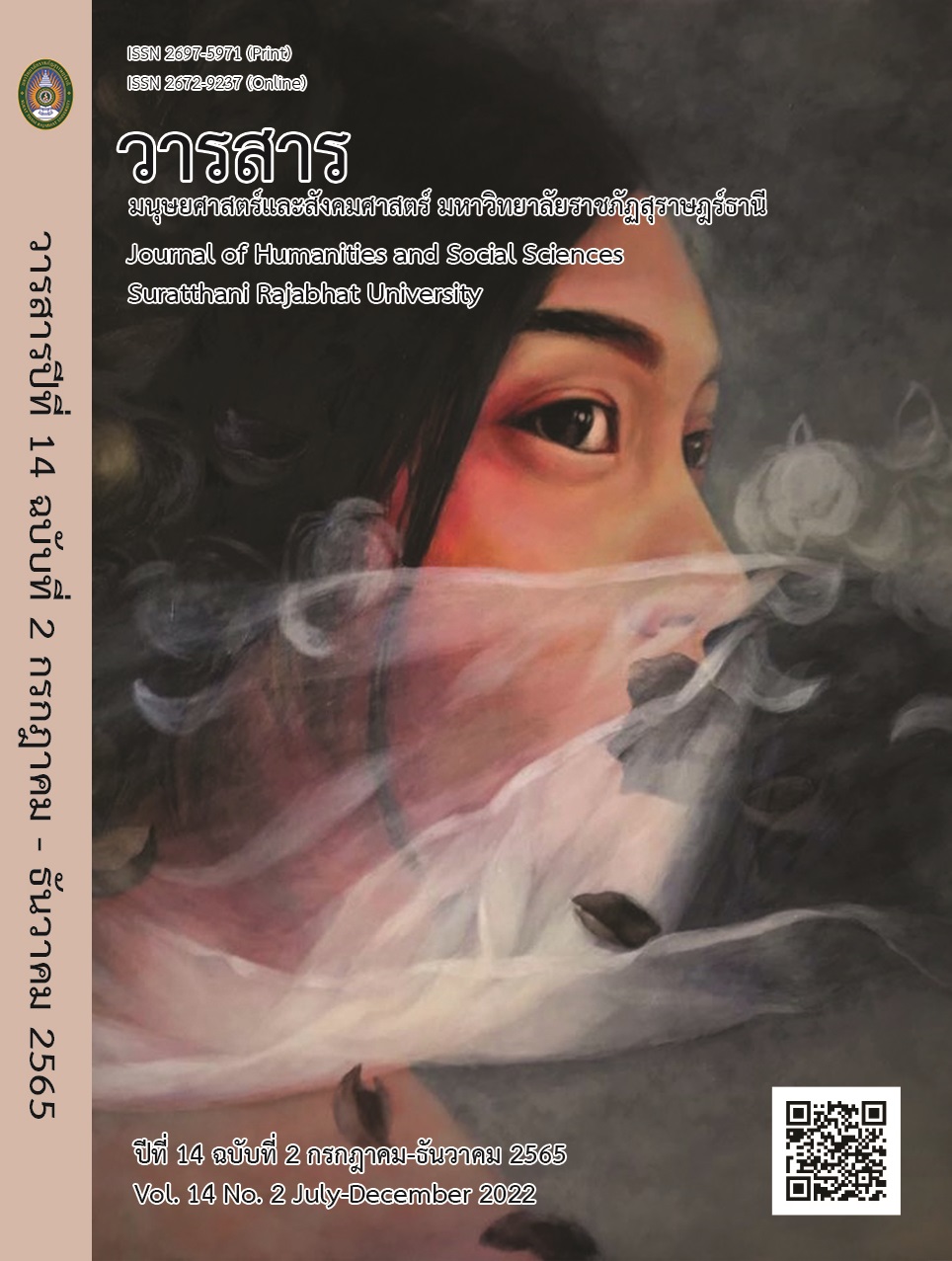Anxiety in Online English Language Courses Learning of English for Service Industries Major Students at Phuket Rajabhat University
Main Article Content
Abstract
evels and analyze the relationship between students' online English learning anxiety and 2) students' levels. The participants were 284 first to fourth-year English for Service Industries major students at Phuket Rajabhat University who enrolled in English courses for the academic year 2020. The samples were 164 selected by systematic sampling. The research instrument used in this study was a five-rating scale questionnaire on online English learning anxiety. The reliability of the questionnaire was 0.8. The data were analyzed using mean value, standard deviation, and Pearson Correlation Coefficient.
The result revealed that the students had moderate online English learning anxiety. As for the relationship between the anxiety level in studying online English language courses and the level of students, it was found that there was a moderate negative relationship between the anxiety level in studying online English language courses and the level of students with a statistically significant difference ( p < .05). Therefore, It is important to note that there is a moderate negative relationship between the anxiety level in studying online English language and the level of students. The research will benefit online teaching and learning providers and students by contributing to improving and developing online teaching and learning styles that are suitable for learners. Meet learners' needs and contribute to online learning's efficiency and effectiveness.
Article Details

This work is licensed under a Creative Commons Attribution-NonCommercial-NoDerivatives 4.0 International License.
All published manuscripts have been verified by peer-peer professors in the fields of humanities and social sciences. Reprinting of the article must be authorized by the editorial staff.
References
กรมสุขภาพจิต. (2563, 30 พฤษภาคม). กรมสุขภาพจิตเผยผลกระทบของสถานการณ์การ
แพร่ระบาดของโรค COVID-19 ส่งผลต่อเด็กและเยาวชน. จีนิวส์. https://
gnews.apps.go.th/news?news=62197
กระทรวงศึกษาธิการ. (29 มีนาคม 2563). ศธ.สั่งปรับแผนงบกระทรวง เรียนออนไลน์
งดเก็บค่าเทอมปวส. https://moe360.blog/2020/03/29/ศธ-สั่งปรับแผนงบ
กระทรวง/
กองทุนเพื่อความเสมอภาคทางการศึกษา (กสศ.). (23 พฤษภาคม 2563). ปรับการศึกษาสู้
โควิด-19 เน้นกระบวนยืดหยุ่นตามบริบทพื้นที่. https://www.eef.or.th/822-2
จิราพร ภราดร์นุวัฒน์. (2554). การศึกษาความวิตกกังวลในการเรียน ภาษาต่างประเทศ
ของนิสิตชั้นปีที่มหาวิทยาลัยศรีนครินทรวิโรฒ. วิทยานิพนธ์ ศศ.ม. (การสอน
ภาษาอังกฤษในฐานะภาษาต่างประเทศ). กรุงเทพฯ: มหาวิทยาลัยศรีนครินทรวิโรฒ.
นพรัตน์ เตชะพันธ์รัตนกุล. (2563, มกราคม-มิถุนายน). ความวิตกกังวลในการเรียนวิชา
ภาษาอังกฤษเพื่อการสื่อสารในชีวิตประจำวันของนักศึกษาระดับปริญญาตรีชั้น
ปีที่ 1 มหาวิทยาลัยเทคโนโลยีราชมงคลล้านนา เชียงใหม่. วารสารบัณฑิตศึกษา
ปริทรรศน์ มหาวิทยาลัยมหาจุฬาลงกรณราชวิทยาลัยวิทยาเขตแพร่, 6(1), 182-
บุษยา สันติกาญจน์. (2563, มกราคม-เมษายน). ปัจจัยที่เกี่ยวข้องกับความวิตกกังวลใน
การเรียนภาษาอังกฤษของนักศึกษาชั้นปีที่ 1. วารสารมนุษยศาสตร์และ
สังคมศาสตร์ มหาวิทยาลัยราชพฤกษ์, 6(1), 13-25.
พิริยะ ผลพิรุฬห์. (2563, 28 เมษายน). เรียน “ออนไลน์” กับการปิด-เปิดโรงเรียนในช่วง
โควิด-19. โพสทูเดย์. https://www.posttoday.com/finance-stock/col
umnist/621935
วีโอเอไทย. (2563, 31 มกราคม). สรุปสถานการณ์ “โคโรนาไวรัส” วันพฤหัสบดีที่ 30
มกราคม 2563. วีโอเอไทย. https://www.voathai.com/a/coronavirus-
wuhan-wrap-30jan20/5267351.html
ศิรินันท์ นุยภูเขียว. (2561, พฤษภาคม-สิงหาคม). ปัจจัยที่ส่งผลกระทบต่อความวิตกกังวล
ในการเรียนภาษาอังกฤษของนักศึกษาชั้นปีที่ 1: กรณีศึกษามหาวิทยาลัยราชภัฏ
พระนครศรีอยุธยา. วารสารวิชาการมหาวิทยาลัยธนบุรี, 12(28), 231-243.
Brown, M. M. (2002). The effect of test anxiety on the achievement test
scores of high school students as measured by the preliminary
scholastic test. [Doctoral dissertation. South Carolina State University:
The USA.] ProQuest Dissertations Publishing. https://www.proquest.
com/openview/231f3b333de6996960d682a8c30c2a4c/1?cbl=18750
&diss=y&pq-Lj7GOXEV8XmwbX30S%2BXIZZzWXBQBVwyhWjmsdFu
JGh0%3D
Huang, P., & Hwang, Y. (2013). An exploration of EFL learners’ anxiety and
e-learning environments. Journal of Language Teaching and
Research, 4(1), 27-35.
Hu, H., M. & Nassaji, H. (2014). Lexical inferencing strategies: The case of
successful versus less successful inferencers. System, 45, 27-34.
Khoshaim & et al. (2020). Anxiety level of university students during
COVID-19 in Saudi Arabia. Frontiers in Psychiatry, 11(1), 1-7.
Lian, L. H., & Budin, M. B. (2014). Investigating the relationship between
english language anxietyand the achievement of school based oral
english test among malaysian form four students. International
Journal of Learning, Teaching and Educational Research, 10(13), 67-79.
Nan, J., & Haoda, F. (2020). Research on students’ anxiety in online English
classes during the epidemic Bohai University as an Example. Conference:
rd International Conference on Humanities Education and
Social Sciences (ICHESS 2020), 496(3), 627-633. https://doi.
org/10.2991/assehr.k.201214.576
Office of the Higher Education Policy, National Science, Research and Innovation
Council. (2020, June 23). Recovery Forum: School Reopening and
Teacher Empowerment to Cope with the Next Normal in Education.
https://www.nxpo.or.th/th/en/4948/
Wang & et al. (2020). Experiences and attitudes of elementary school
students and their parents toward online learning in China during
the COVID-19 pandemic: questionnaire study. Journal of Medical
Internet Research, 23(5), 1-9.


